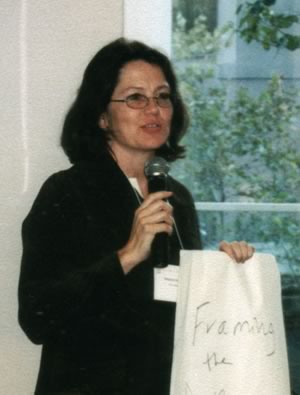Danalynn Recer
Calvin “Jerry” Burdine’s county-appointed lawyer dozed through much of his trial, but that did not prevent jurors in Harris County, Texas, from convicting Burdine and sentencing him to die by lethal injection in 1984. It was cases like Burdine’s that gave Harris County its well-earned reputation as America’s “capital of capital punishment.” In 1991 Burdine won a retrial when an appellate court concluded that “a sleeping lawyer is no lawyer at all,” but the judge in the original case turned down Burdine’s choice of lawyer for the new trial.
In response, Danalynn Recer went home to Houston to take on Burdine’s seemingly lost cause–and the Harris County legal system. Given just 96 days to prepare her case, she convinced 50 local attorneys, including the entire board of the county’s Criminal Law Association, to sign a letter of protest that won her client a continuance, slowing the rush to injustice. After a year of aggressive pre-trial challenges to the county’s capital crime practices demonstrating racial bias in its grand jury selection, the inadequacy of its pre-trial discovery and its refusal to hold pre-trial evidentiary hearings, she negotiated a plea agreement, saving Jerry Burdine from a new death sentence. He will serve the rest of his life in prison.
Recer first became interested in matters of life and death as a research assistant to the director of the African-American Studies Department at the University of Texas, who was doing a study of lynching in Kentucky. No stranger to hardship herself, she was 14 when her mother died of a drug overdose. After a couple of years with her estranged father, Recer was out on her own. Married and divorced before she was twenty, she won a scholarship to the University of Texas and went on to do her master’s thesis there on lynching.
Contacted by the Texas Resource Center, a federally funded agency that provided post-conviction representation to death-row inmates, Recer signed on as a volunteer in the effort to stop “legal lynching.” She soon became a full-time investigator, then an attorney. Recer proved tireless in digging into the records and life circumstances of indigent clients to unearth facts that might mitigate their sentences and soon gained a national reputation for her “scorched earth” style of investigation. When the Center lost its funding, Recer went to Louisiana to do capital trial work alongside the legendary Clive Stafford Smith
As staff counsel with the Louisiana Crisis Assistance Center, Recer helped to win reduced sentences or acquittals for over a dozen defendants in capital cases and spared the lives of seven capitally charged clients through plea bargains. She developed investigative standards and protocols that, together with Stafford Smith’s “creative motions practice,” are now widely copied in other jurisdictions.
Through the Mexican Capital Legal Assistance Program, Recer represents the government of Mexico in protecting the rights of Mexican nationals tried for capital crimes in Texas and Oklahoma. Currently completing a PhD program and training lawyers, students and social workers in the conduct of mitigation investigations, but still excluded from Harris County’s list of court-approved attorneys, Recer takes cases there on a pro bono basis.
In 2002 she founded the Gulf Region Advocacy Center to raise standards of capital trial representation in Texas. Working out of an attic apartment with a shoestring budget and a staff composed primarily of European and Australian volunteers, Danalynn Recer continues to “pray for the dead and fight like hell for the living.”
